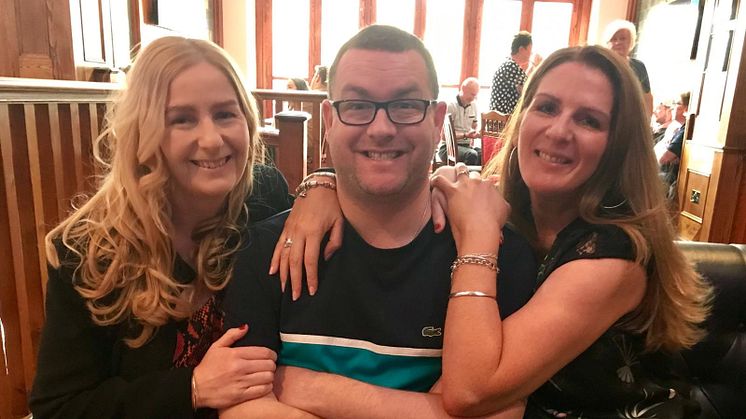
Press release -
Stroke survivors in Wales battling hidden mental health problems
More than 60,000 people in Wales who have survived a stroke are still dealing with the hidden effects, including changes in their mental or emotional health, according to new findings published today by the Stroke Association.
There are currently almost 70,000 stroke survivors in Wales, and the majority (94%) reported they’ve experienced at least one cognitive effect after their stroke; meaning something that is not immediately obvious such as changes in emotions or mental health.
More than three quarters (76%) face a battle with depression, anxiety, a lack of confidence, mood swings or even suicidal thoughts. Yet worryingly, more than a quarter (29%) of people say they have not received enough emotional support to help rebuild their lives.
The Lived Experience of Stroke report is the Stroke Association’s largest ever survey of people affected by stroke, with more than 600 people responding in Wales. The research demonstrates how the hidden effects of stroke affect almost everyone, yet can often go unnoticed by the people closest to the stroke survivor.
Gary Scott from Swansea was just 26 when he had a stroke. Now 35, he says the stroke left him with severe fatigue and emotional challenges: “I felt depressed, was drinking too much and thought of ending things. If you’ve got problems inside your brain, others can’t see it.
“Eventually I spoke to my family who helped me get counselling. I also had fantastic support from the Stroke Association coordinator and other survivors at the Neath Port Talbot Stroke Group.
“Now I volunteer to help other people rebuild their lives after stroke. I tell them to try and think positive and not bottle things up. If anyone is experiencing mental health problem after a stroke, I’d say share how you feel with your family or a counsellor – get support.”
Carol Bott, Director of the Stroke Association in Wales, says, “This report exposes the true devastation stroke can bring. These figures are extremely concerning, and show a desperate need for support to cope with the hidden, and often overlooked, effects of stroke. Far too many lives have been destroyed by stroke, and no-one should be left feeling suicidal. The evidence highlights how important it is that families, friends and health professionals who support stroke survivors understand what it means to live with these ‘hidden effects’, ask how people are feeling, and provide appropriate emotional and psychological support.”
The findings also show that in Wales;
●Fatigue is the most common hidden effect of a stroke, experienced by 85% of survey respondents. Unlike normal tiredness fatigue doesn’t get better with rest; people often lack the physical or mental energy to take part in everyday activities.
●81% of stroke survivors told us they have problems with their memory.
●79% of stroke survivors reported problems with concentration. This could include being unable to follow a television programme or read a book.
●76% of stroke survivors experienced mental health issues following their stroke, including a lack of confidence, anxiety, depression, mood swings or suicidal thoughts.
●However, with time and the right support, stroke survivors begin to feel better. 96% of people said they feel like they are on the road to recovery.
The Stroke Association has published the Lived Experience of Stroke report to expose the realities of living with stroke, and highlight the many gaps in support that still exist. The charity wants everyone affected by stroke to have access to the support that they need, when they need it.
Carol continues, “There is hope. We know from these findings that things can, and do, improve over time for many stroke survivors. Evidence shows that many are still recovering years after their stroke. That’s why we’re now working across the UK nations to support and drive changes which will improve the lives of people affected by stroke.
“We’re working with the National Assembly for Wales’s Cross Party Group on Stroke to scrutinise delivery of the Stroke Delivery Plan, which sets out how stroke care should look in Wales. We want to ensure The Plan supports health and care services to make improvements from prevention and treatment right through to rehabilitation and long-term support after leaving hospital, including psychological support for stroke survivors.”
Dr Eirini Kontou, Clinical Psychologist and Senior Research Fellow at the University of Nottingham, said: “Many stroke survivors experience a wide range of overwhelming emotions, such as depression or anxiety, which can have an impact on their recovery and quality of life. There are effects of stroke that cannot be seen, so it is important that people can talk about how they feel and access the support required to rebuild their lives. This report highlights that we need to make sure that all stroke survivors and their families can get emotional support when they need it most.”
The Hidden Effects of Stroke report is part one of a four-part series focusing on the Lived Experience of Stroke. For more information about the Lived Experience of Stroke – Hidden Effects report, visit www.stroke.org.uk/lived-experience-of-stroke-report.
For more details of support available in your area, please contact the Stroke Association helpline on 0303 303 3100. If you’re struggling to cope, you can contact the Samaritans free any time from any phone on 116 123, even a mobile without credit. This number won’t show up on your phone bill. Or you can email jo@samaritans.org or visit www.samaritans.org to find details of your nearest branch, where you can talk to a trained volunteer face to face.
Topics
Categories
Regions










